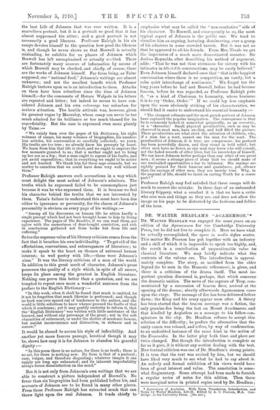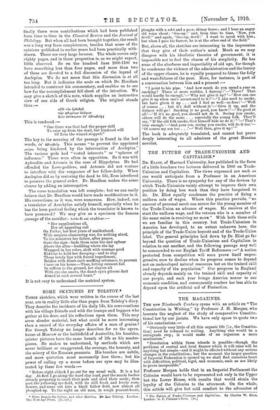DR. WALTER HEADLAM'S "AGAMEMNON." DR. WALTER FIEADLAM was engaged for
some years on an edition of the Agamemnon for the Cambridge University Press, but he did not live to complete it. Here we have what he aCtually accomplished, the opere in medic) deka aratra. This matter Mr. Pearson has put together with an industry and a shill of which it is impossible to speak too highly, and the result is a contribution of unquestionable value tca classical literature. We may briefly indicate what they contents of the volume are. The introduction is approxi mately complete. The story, as modified from the older legend (to be seen in the Homeric references), is given, and there is a criticism of the drama itself. The most im- portant question discussed is, perhaps, that which concerns: the dramatic unities. The news of the capture of Troy, com- municated by a succession of beacon fires, arrived at the opening of the drama; shortly afterwards Agamemnon came upon the stage. The message of fire has been delivered before• dawn ; the King and his army appear soon after. A theory has been started that the beacon message was a fiction, the only genuine fire being the last on Mount Arachnaeus, and, that kindled by Aegisthus as a message to his fellow-con,- spirators in the city. Dr. Headlam refuses to accept this solution of the difficulty ; he prefers the alternative that the unity canon was relaxed, and refers, by way of confirmation, to an undoubted instance of the same kind in the action of the Eumenides. In the latter play both time and place are twice changed. But though the introduction is complete as far as it goes, it is without any section dealing with the text. Now textual criticism was one of Dr. Headlam's strong points. It is true that the text was revised by him, but we should have liked very much to see what he had to say about it. An orderly and formal exhibition of his views would have been of great interest and value. The annotation is some- what fragmentary. Some attempt had been made to furnish a regular series of notes for this edition. Then there were marginal notes in printed copies used by Dr. Heacllam ; • A7antemnon of Aeschylus. With Verse Translation, Introduction, and Notes ty Walter Headlam, Litt.D. Edited by A. C. Pearson, M.A. Cam- bridge : at the University Press. [10s. net.]
filially there were contributions which had been published from time to time in the Classical Review and the Journal of Philology. But when all had been brought together, the result was a long way from completeness, besides that some of the opinions published in earlier years had been practically with- drawn. There are very large lacunae. The whole covers only eighty pages, and in these proportion is, as we might expect, little observed. So on the hundred lines 1000-1100 we bare something less than four pages, and more than two of these are devoted to a full discussion of the legend of Asclepius. We do not mean that this discussion is at all too long. But it indicates the scale on which Dr. Headlam intended to construct his commentary, and enables us to see • how far the accomplishment fell short of the intention. We may give a sketch of this note, which supplies an instructive view of one side of Greek religion. The original stands • thus
oidi Tbv 104384 iv opeigivisv avtiyeir Zebs dirigraio-ev d/3XaSeki
This is rendered
One there was that had the proper skill
To raise up from the dead, but hindered will Of Zeus the wizard stopped."
The key to the meaning of the passage is found in the last words, ?e* aomoda. This means "to prevent the appointed
pap= being hindered by the intervention of Asclepius." The various gods had "vested interests" or "spheres of influence." These were often in opposition. So it was with Aphrodite and Artemis in the case of Hippolytus. He had offended the Love-goddess, and Artemis did not venture
to interfere with the vengeance of her fellow-deity. When Asclepius did so by restoring the dead to life, Zeus interfered to preserve the general order. Dr. Headlam makes the sense clearer by adding an interrogative.
The verse translation was left complete; but we can easily 'believe that Dr. Headlam would have made modifications in it.
His corrections, as it was, were numerous. How, indeed, can .a translator of Aeschylus satisfy himself, especially when he
has the keen poetical feeling which the translator is known to have possessed ? We may give as a specimen the famous ,passage of the sacrifice : Arras n /cal tanneas :—
"Her supplications all, Her oft appealing call On Father, her first years of maidenhood, With umpires clamouring war, for nothing stood.
To his ministers her father, after prayer, Gave the sign—bade them seize her and upbear Above the altar—huddling where she lay Wrapped in her robes, aloft with courage good Kidwise to hold her drooping—and to stay Those lovely lips with forced impediment, Bridles with dumb curb muffling utterance, to prevent • Curse on his house.—Thus, letting raiment fall In saffron to the ground, her slayers all With eye she smote, the dumb eye's piteous dart Aimed at each several heart."
It is not easy to understand the metrical system.



































































 Previous page
Previous page